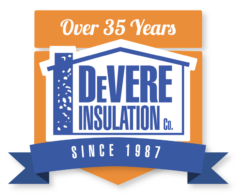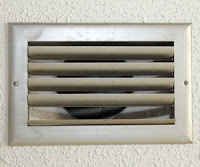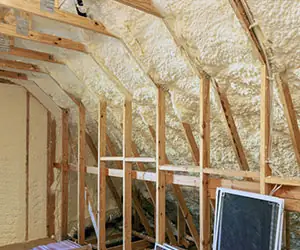Looking to build a new home in Baltimore or elsewhere in Maryland that is truly energy efficient? One critical factor that often gets overlooked is airflow management, a key component of building science. When a home has improper airflow, it can impact both the home and its residents, causing even the best insulation or appliances to fall short.
Let’s explore why airflow matters, how to control it, and what Maryland builders need to know to meet (and exceed) code, improve comfort, and save money.
Why Airflow Matters in Home Efficiency

According to the National Institute of Standards and Technology (NIST), infiltration can account for up to 30% of a home’s energy use. But the problems don’t stop there. Uncontrolled airflow can also create moisture issues that lead to mold growth, bring in air pollutants, mess with humidity levels, and affect the efficiency of the HVAC system. All of which can impact indoor air quality.
The solution is to have a controlled airflow strategy. That means building in a way that lets you decide how air moves, using smart ventilation systems, exhaust fans, and tight construction. This helps keep your HVAC system running more smoothly and reduces energy waste.
Uncontrolled vs. Controlled Airflow
There are two common types of building airflow. Uncontrolled airflow, or infiltration, is the type of airflow many people are familiar with. Years ago, uncontrolled airflow was also known as having a “leaky” home. Uncontrolled airflow essentially means cold air sneaks in during winter, and warm, outdoor air leaks in during summer in a random fashion. This could be through cracks, unsealed edges, or poorly fitted windows and puts a strain on a home’s heating and cooling systems.
Controlled airflow is different. It works by controlling airflow so that it works with the home’s HVAC system to regulate humidity levels and boost performance. Airflow is carefully managed using mechanical ventilation systems that bring in fresh air and remove stale air. This is considered the best way to “build tight and ventilate right.”
By sealing air leaks and adding ventilation systems, especially whole-house ventilation, homes can stay comfortable and healthy without wasting energy.
Insulation and Air Sealing Partnership

When building a new home, it’s important to focus on air sealing key areas in the attic, basement or crawl space, and around windows and doors. Conducting a blower door test is the best way to verify the home is sealed correctly. Air sealing and insulation work together to form a high-performing home and are best done during construction.
Maryland Climate and Code Considerations
Almost our entire state is in Climate Zone 4A, considered a mixed-humid zone. This climate zone brings unique challenges thanks to our hot and humid summers and very cold and snowy winters. In summer, outdoor air can carry in moisture, raising humidity levels and encouraging mold growth. In winter, cold air infiltration can cause condensation problems.
To help prevent this, our state energy code requires builders to meet certain requirements to create an energy-efficient building envelope. This includes installing correct R-values of insulation (R-49 in attics/ceilings and R-20 in walls) and an air tightness standard of 3 ACH50 (air changes per hour). Air leakage is measured by blower door testing and mechanical ventilation is required for airtight homes.
Maryland Programs and Incentives

ENERGY STAR certified homes are at least 10% more energy efficient than homes only built to code and can save future homeowners significant money on their energy bills. Our state is making a big push towards efficiency. Take advantage of the opportunity to be rewarded for building homes that maximize energy efficiency standards. Check out these other new home incentives too.
Build an Energy-Efficient Home with DeVere
Have questions about your new home project’s ventilation and overall energy efficiency? Our expert team at DeVere Insulation is here to help. We’ve been a part of the Baltimore community since 1987 and have the insulation and air sealing solutions you need to create an energy-efficient home you and future homeowners can be proud of. Contact us today to learn more and schedule your free estimate.
References
Energy.gov. (2025, March 31). Insulation. U.S. Department of Energy. Retrieved from https://www.energy.gov/energysaver/insulation
Maryland Energy Administration. (n.d.). EmPOWER Maryland. Retrieved May 23, 2025, from https://energy.maryland.gov/pages/facts/empower.aspx
My Green Montgomery. (2021, April 13). EmPOWER Maryland’s Incentives for New Home Construction. Montgomery County, MD. Retrieved from http://mygreenmontgomery.org/2021/empower-marylands-incentives-for-new-home-construction/
National Institute of Standards and Technology. (n.d.). Infiltration. Retrieved May 23, 2025, from https://www.nist.gov/el/energy-and-environment-division-73200/nist-multizone-modeling/infiltration
Straube, J. (2007). BSD-014: Air Flow Control in Buildings. Building Science Corporation. Retrieved from https://buildingscience.com/documents/digests/bsd-014-air-flow-control-in-buildings
U.S. Department of Energy & U.S. Environmental Protection Agency. (2010, April 12). Retrofit Techniques & Technologies: Air Sealing – A Guide for Contractors to Share with Homeowners (Building America Best Practices Series, Vol. 10) energystar.gov
DeVere Insulation. (2020). Want an Efficient Home? Manage Airflow. (Original blog content). Baltimore, MD.devereinsulation.com


